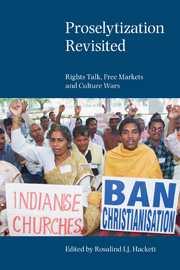Book contents
- Frontmatter
- Contents
- Preface and acknowledgements
- Contributors
- Revisiting Proselytization in the Context of Rights Talk, Free Markets and Culture Wars
- Section I
- Section II
- Section III
- Buddhism and the Politics of Conversion in Sri Lanka
- Merit and the Search for Inner Peace: the Discourses and Technologies of Dhammakaya Proselytization
- Asia's Antioch: Evangelica Christianity and Proselytism in Singapore
- False Consciousness and the Jargon of Authenticity: Religion and Nationalism in the Christianised Lowland Philippines
- Salvation through Secular Protest: the Development of Falun Gong Proselytization
- The Social and Legal Context of Proselytization in Contemporary Japanese Religions
- Section IV
- Section V
- Index
Salvation through Secular Protest: the Development of Falun Gong Proselytization
from Section III
- Frontmatter
- Contents
- Preface and acknowledgements
- Contributors
- Revisiting Proselytization in the Context of Rights Talk, Free Markets and Culture Wars
- Section I
- Section II
- Section III
- Buddhism and the Politics of Conversion in Sri Lanka
- Merit and the Search for Inner Peace: the Discourses and Technologies of Dhammakaya Proselytization
- Asia's Antioch: Evangelica Christianity and Proselytism in Singapore
- False Consciousness and the Jargon of Authenticity: Religion and Nationalism in the Christianised Lowland Philippines
- Salvation through Secular Protest: the Development of Falun Gong Proselytization
- The Social and Legal Context of Proselytization in Contemporary Japanese Religions
- Section IV
- Section V
- Index
Summary
In July 1999, a cultivation practice known as Falun Gong (FLG) was banned in the People's Republic of China (PRC). In response, FLG became a protest movement using non-violent means to advocate their cause and seek redress. Their goal was to counteract the Chinese government's negative portrayal of the movement, and end the ban and alleged mistreatment of its members within China. The founder of the group, Li Hongzhi, developed teachings to explain the crisis to his followers, and, over time, changed the tasks of his disciples, moving them from a primary goal of personal cultivation into a culture of protest and salvation. This chapter explores, therefore, how religious dogma and goals, here in the case of FLG, become transformed in response to events, and how a sacred, soteriological message becomes embodied in a secular message. It illustrates how salvation is articulated, not just in terms of acceptance of a strict religious perspective, but also by adherence to a secular view. Finally, this case study reveals how the interface of media with goals of religious ultimate concern and political protest creates a rich environment for proselytization. In the case of FLG, this proselytization is of both a secular and religious nature.
I will begin with a brief description of FLG's background in the PRC and its shift from a legitimate group to a banned group in crisis. I will then explore the attitude of FLG practitioners towards proselytization and salvation, and how these beliefs developed progressively within a culture of protest and salvation.
- Type
- Chapter
- Information
- Proselytization RevisitedRights Talk, Free Markets and Culture Wars, pp. 301 - 320Publisher: Acumen PublishingPrint publication year: 2008



